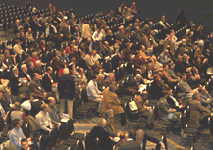E Bruce Brooks
University of Massachusetts at Amherst
The Commandments of Jesus
Panel: The Historical Jesus
Society of Biblical Literature, San Diego, 17-20 Nov 2007
This proposal was not accepted by the Panel committee
Abstract In my own researches, I have reached the same point as Wellhausen and Wrede: Even the earliest Gospel, Mark, is an apologia, designed to explain Jesus. It is also a legitimation document, which prescribes beliefs and records practices of the early Church. If so, then any traces of the Historical Jesus may well be overlaid in Mark by later theories and concerns. To locate such traces, we may attempt to read Mark against itself, looking for inconsistencies of which one term is known to be late tradition. The other term, then, may conceivably be a survival of early tradition.
One such passage is Mk 10:17-19, in which Jesus seems to reject the idea of his own sinlessness, prescribes a list of commandments which adds to the second or interhuman table of the Mosaic Decalogue a prescription against fraud, and which pointedly omits the first table of the Decalogue, which sets forth rules of piety toward God. Each of these features has caused difficulty for later scribes and commentators, and the passage is thus unlikely to represent late tradition. If we accept it as early, we find resonances not only with other passages in Mark and in the later Synoptics, but in the Qumran documents, in James, and in early Church hymns embedded in Philippians and 1 Timothy. The implication is that Jesus, like John before him, preached not Resurrection but Repentance, and that his chief innovation was to restrict the Mosaic heritage to man's duty to man, and to reject piety toward sacred places and times, and the other purity rules which had been greatly elaborated in post-Mosaic Judaism.
From this vantage point, not only are certain residues in the NT documents intelligible as first practice, but so are the traditions and beliefs, the second practice, which arose later in Church history.
All lectures and abstracts posted on this site are Copyright © by their authors.
2 Mar 2007 / Contact The Project / Exit to Conferences Page
